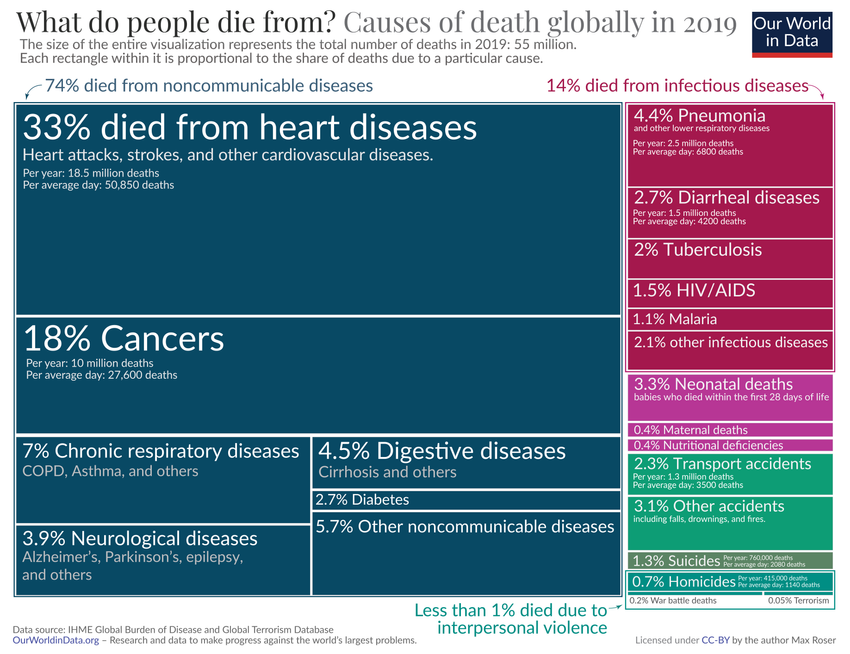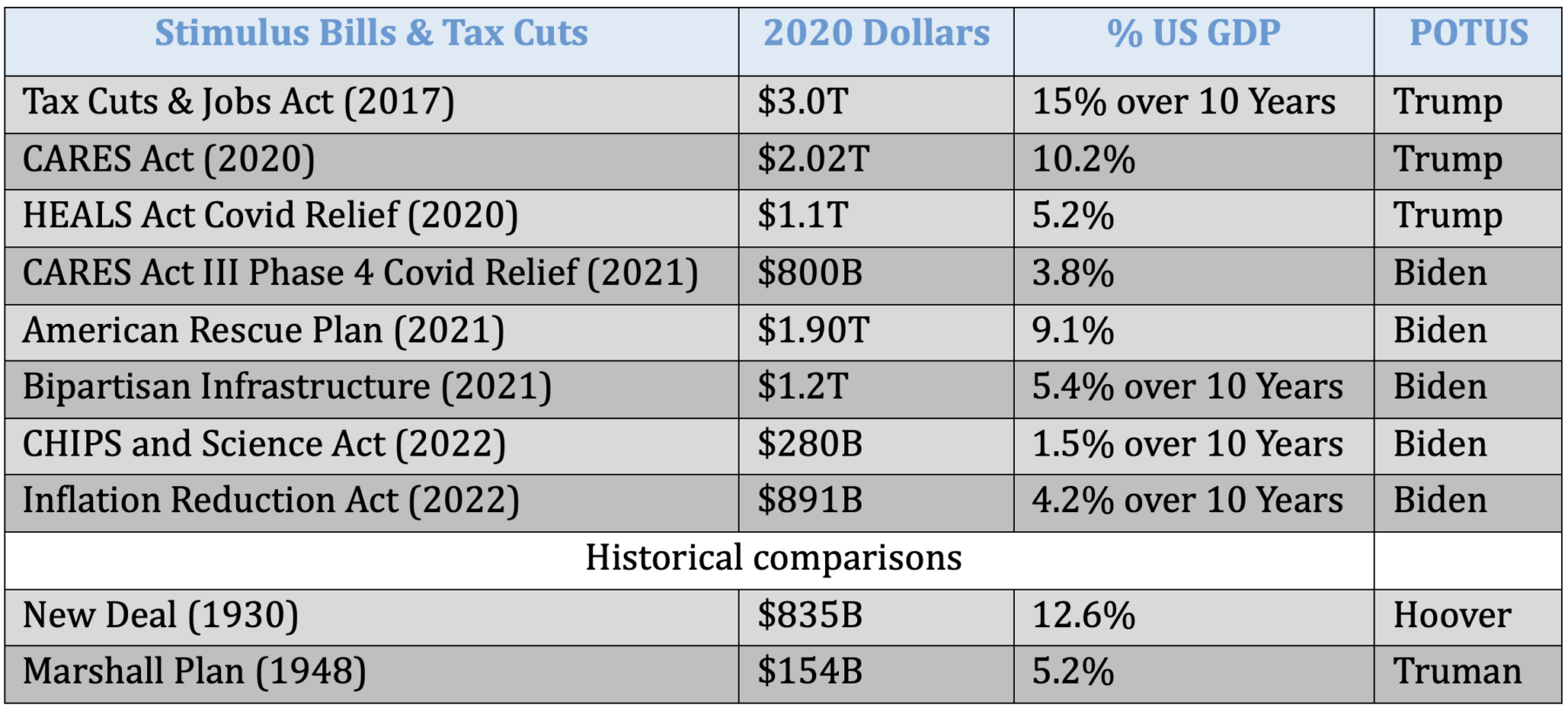Considered one of my favourite obligations as chief funding officer at Ritholtz Wealth Administration is the quarterly convention name I do for our purchasers. I run by way of 30 charts in 30 minutes that specify the place we’re within the financial cycle, what markets are doing, and what it means to their portfolios. I like to complete with a thought-provoking, typically “investing-adjacent” concept they won’t have beforehand thought of.
This quarter, it was Sentiment. I’ve gotten so many emails about these previous couple of slides I made a decision to share that offline dialogue right here.
My prior sentiment discussions targeted on two issues: The final unreliability of surveys — asking individuals questions after which assuming their solutions are correct or trustworthy; they don’t seem to be, actually because persons are detest to say “I don’t know.” 1
The second problem is just how astounding survey information has been over the previous decade; e.g., individuals’s self-reported emotional state in 2022 was worse than the very worst occasions of the previous few a long time.2
Regardless, one thing is amiss.
From an financial standpoint, issues are a lot better than individuals appear to be keen to confess: The speed of inflation has plummeted by two-thirds from 9% to somewhat over 3%, however 60% of respondents consider inflation is “persevering with to extend.” The financial system isn’t heading in the right direction, at the same time as Individuals’ Internet Value Surged by Most in Many years Throughout Pandemic.
Since 2019, Households invested extra, dwelling values jumped, and financial savings ranges have risen. Current beneficial properties pushed by fiscal stimulus have reached deeper into the decrease financial strata than the beneficial properties we noticed within the 2010s, pushed as they have been by financial stimulus, and concentrated in shares, bonds actual property, and companies, e..g., among the many high 10%.
Whereas the current beneficial properties have been accompanied by an inflationary surge, it was additionally the primary time in an extended whereas the underside half of the labor power noticed substantial wage beneficial properties in an extended whereas. After all, these two points are associated, as a lot of the current inflation will be attributed to all of that fiscal stimulus.
And but, sentiment readings say persons are angrier, consider they’re much less effectively off, and say they’re extra sad than ever earlier than. Even when politics and partisanship deserve some blame, what’s it that’s driving that? 3 This was evident method again in 2015, when the post-GFC restoration was in full flower however was broadly ignored by a lot of the inhabitants.4
Individuals’s perceptions don’t match the info. Why?
Diving deep down this rabbit gap, I pulled some attention-grabbing information from the Nieman Media lab at Harvard (through Bruce Melman). Two separate information units reveal level to a significant supply of this angst.
The primary is a gaggle of charts protecting 20 years by way of 2019, titled “Prevalence of Emotional Payload in Headlines.”
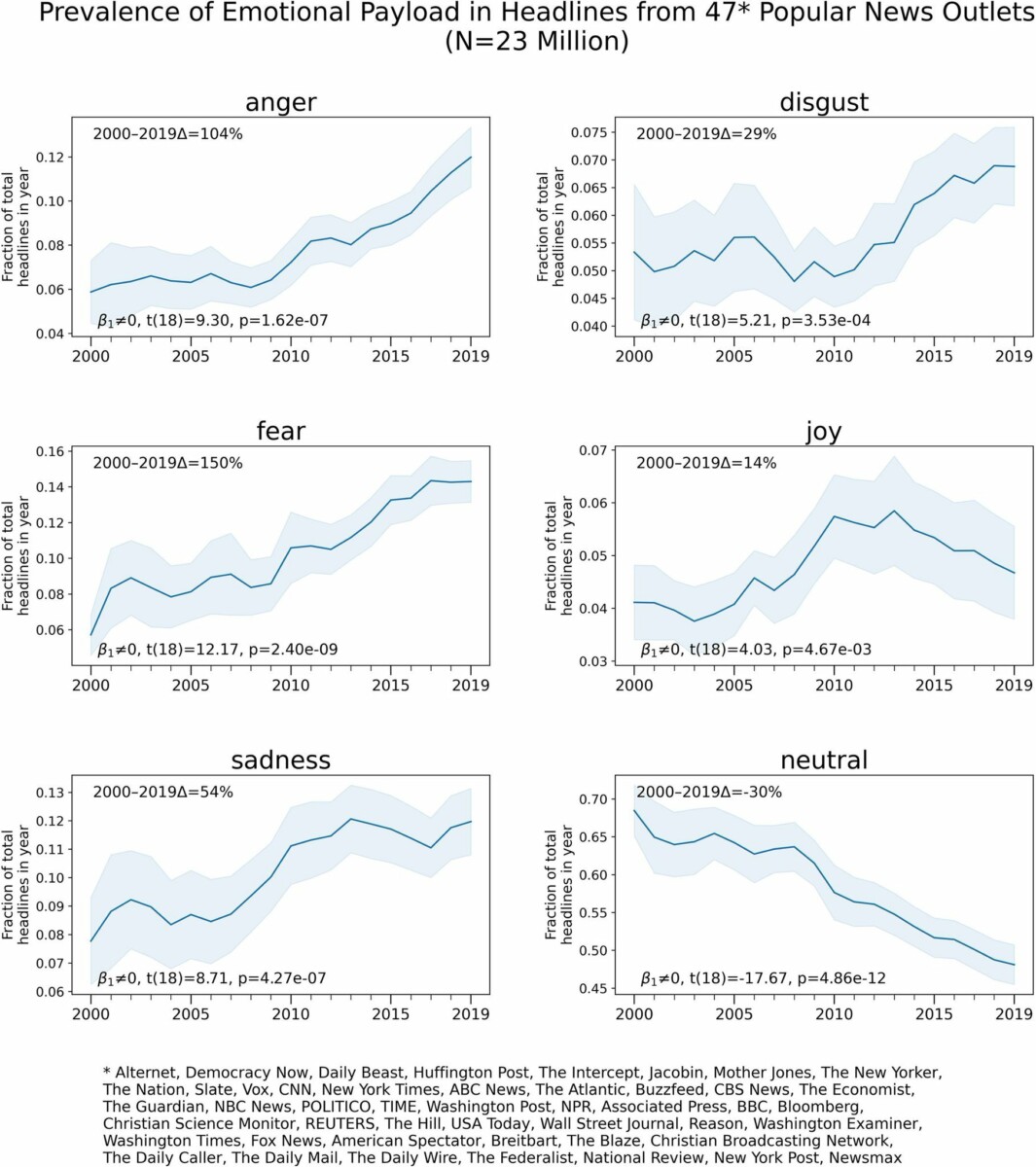

Whereas the previous few a long time have been difficult to all media corporations, the 2010s appears to be once they shifted their on-line presence to a way more aggressive stance. Maybe most important is in the way in which protection turned more and more “click-bait” oriented through headlines crammed with emotionally loaded language: Phrases that conveyed “Disgust” rose 29% and “Disappointment” was 54% greater; phrases that mirrored “Anger” have been up 104%. The largest achieve was from maybe essentially the most emotionally loaded phrase: “Worry” skyrocketed by an enormous 150%. And the phrases expressing “Pleasure” or “Impartial?” Down 14% and 30% respectively. 5
However it’s not simply the headlines that create this world; it’s additionally the selection of matters and focus of media that may lead your understanding of the world astray. Think about causes of loss of life from Our World in Knowledge in the US:
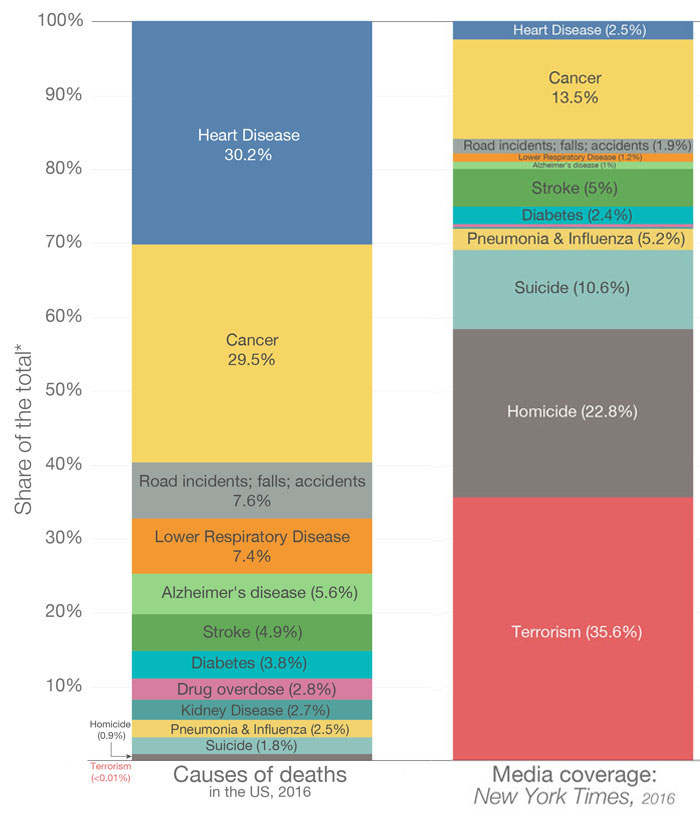

The chances are you’re probably to die from Coronary heart Illness (30.2%), Most cancers (29.5%), a automobile accident or fall (7.6%), and so forth. The very backside of the listing are suicide at 1.8%, murder at 0.9%, and terrorism at 0.01%.
The best way the media covers that is completely inverted: The issues least probably to kill you get essentially the most protection (from most protection to least): Terrorism, Murder, and Suicide seize the entire column inches. Coronary heart illness is close to the very backside of protection.6
I think that the mix of those two components — negatively laden headlines matched with a wildly disproportionate protection — are combining to ship sentiment readings to locations that don’t match the truth of the financial system or extra broadly, the true world round us.
There has at all times been sensationalistic, yellow journalism. The business has been combating a dropping battle in opposition to apps and on-line companies which have crushed a lot of conventional media’s revenues. The response has been to method information protection in an analogous algo-driven, dopamine-chasing method that makes Social media so poisonous. When you can’t beat ’em, be part of ’em appears to be the marketing strategy, even when it makes the remainder of us depressing within the course of.
We’re what we eat, media weight loss plan included.
What appears so totally different at the moment is simply how on-line we’re, and the combination of mainstream media with on-line and maybe worst of all Social Media. It’s making us sad, and more and more indifferent from actuality.
There are real issues each right here and around the globe, however the way in which we think about that world is wildly disparate from the way in which it truly is. This has monumental ramifications for the whole lot from our portfolios, insurance policies and politics…
See additionally,
Failures’ Fallout (Mehlman, August 21, 2021)
Teenagers Spend Common of 4.Eight Hours on Social Media Per Day (Gallup, Oct 13, 2023)
Individuals’ Internet Value Surged by Most in Many years Throughout Pandemic (Bloomberg, Oct. 18, 2023)
The Annoyance Financial system: Knowledge alone don’t seize how irritating and worrying it’s to be a shopper proper now. (Atlantic, Oct. 19, 2023)
Individuals’ Dismal Views of the Nation’s Politics (PEW, September 19, 2023)
Beforehand:
Is Partisanship Driving Shopper Sentiment? (August 9, 2022)
The Bother with Shopper Sentiment (July 8, 2022)
Sentiment LOL (Could 17, 2022)
Re-Engineer Your Media Eating regimen (February 2, 2017)
Cut back the noise ranges in your funding course of (November 9, 2013)
Extra Sign, Much less Noise (October 25, 2013)
The Worth of Paying Consideration (November 2012)
Black Friday Survey #Fails
Sources:
Adjustments in U.S. Household Funds from 2019 to 2022
Survey of Shopper Funds
Federal Reserve October 2023
Causes of Demise
By Saloni Dattani, Fiona Spooner, Hannah Ritchie and Max Roser
Our World in Knowledge, (2023)
_________
1. As we mentioned this previous Summer season:
“Individuals actually don’t have a lot luck forecasting the longer term, they’re simply persuaded by members of their very own tribes, and they’re lower than correct relating to understanding their very own thought processes. Ask a easy query concerning the state of the financial system or how they’re doing, and the outcomes are sometimes a gnarly mass of contradictions. People are unreliable narrators of their very own tales.” –Extra Sentiment Nonsense July 28, 2023
I at all times surprise if the American schooling system’s obsessive give attention to testing is responsible for this…
2. In Is Partisanship Driving Shopper Sentiment? (August 9, 2022) I requested the easy query:
Does it make sense that present sentiment readings are worse than:
1. 1980-82 Double Dip Recession
2. 1987 Crash
3. 1990 Recession
4. 9/11 Terrorist Assaults
5. 2000-2003 Dotcom implosion
6. 2007-09 Nice Monetary Disaster
7. 2020 Pandemic Panic
Past Partisanship as a supply of negativity, others have questioned the polling strategy of calling households with landlines and primarily a lot older than common demographics as “damaged.”
3. Pew Analysis discovered “65% say they at all times or typically really feel exhausted when excited about politics…”
4. Uneven Restoration, Noise & Ignorance: Why Individuals Missed the Restoration (November 16, 2015)
5. Sources analyzed embrace: Alternet, Democracy Now, Each day Beast, Huffington Submit, The Intercept, Jacobin, Mom Jones, The New Yorker, The Nation, Slate, Vox, CNN, New York Occasions, ABC Information, The Atlantic, Buzzfeed, CBS Information, The Economist, The Guardian, NBC Information, POLITICO, TIME, Washington Submit, NPR, Related Press, BBC, Bloomberg, Christian Science Monitor, REUTERS, The Hill, USA At the moment, Wall Road Journal, Purpose, Washington Examiner, Washington Occasions, Fox Information, American Spectator, Breitbart, The Blaze, Christian Broadcasting Community, The Each day Caller, The Each day Mail, The Each day Wire, The Federalist, Nationwide Evaluate, New York Submit, Newsmax.
6. See these charts after the soar displaying full NYT, The Guardian, and Google Search outcomes of those matters.
Assorted associated graphics and charts
click on to make bigger
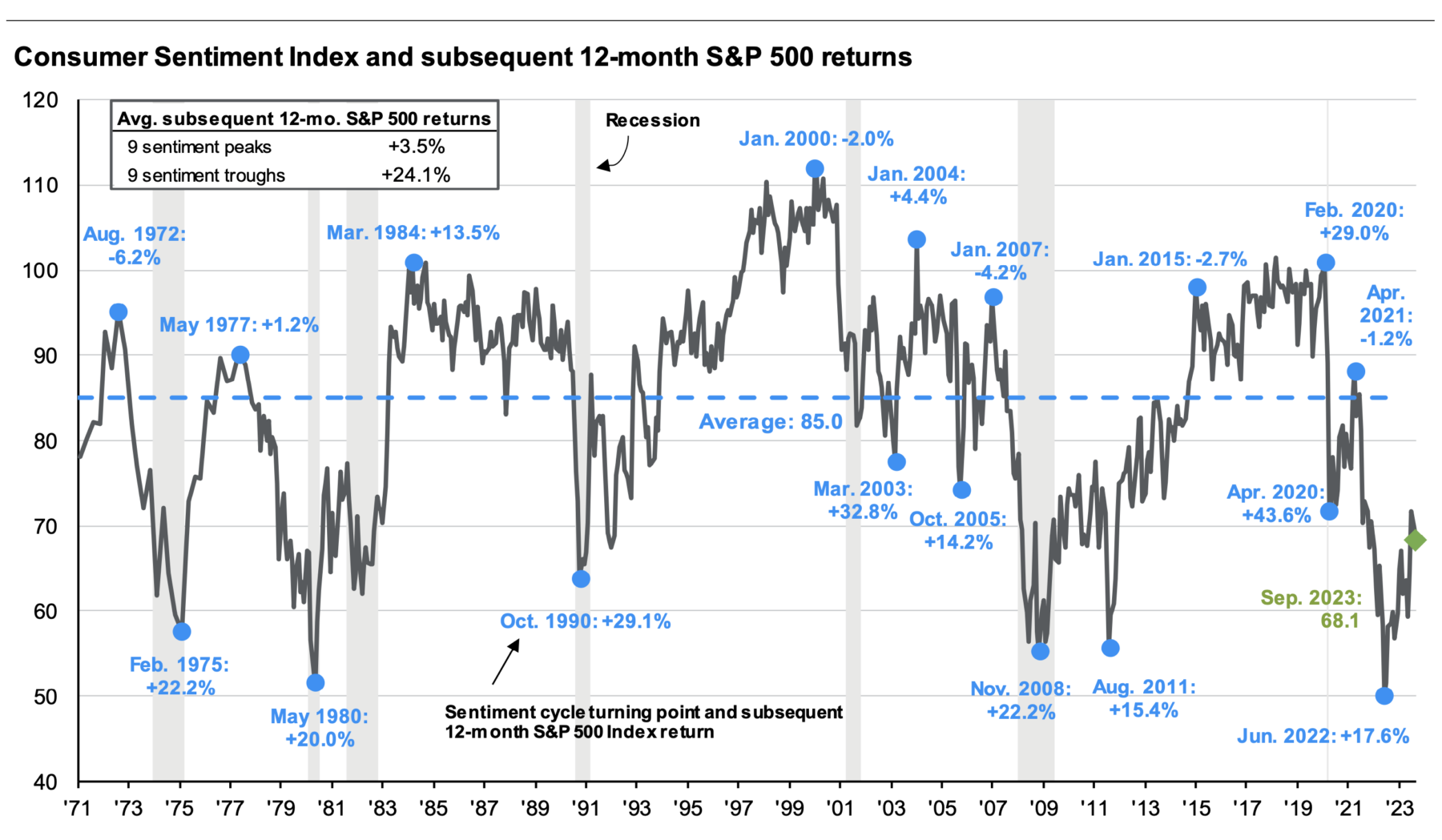

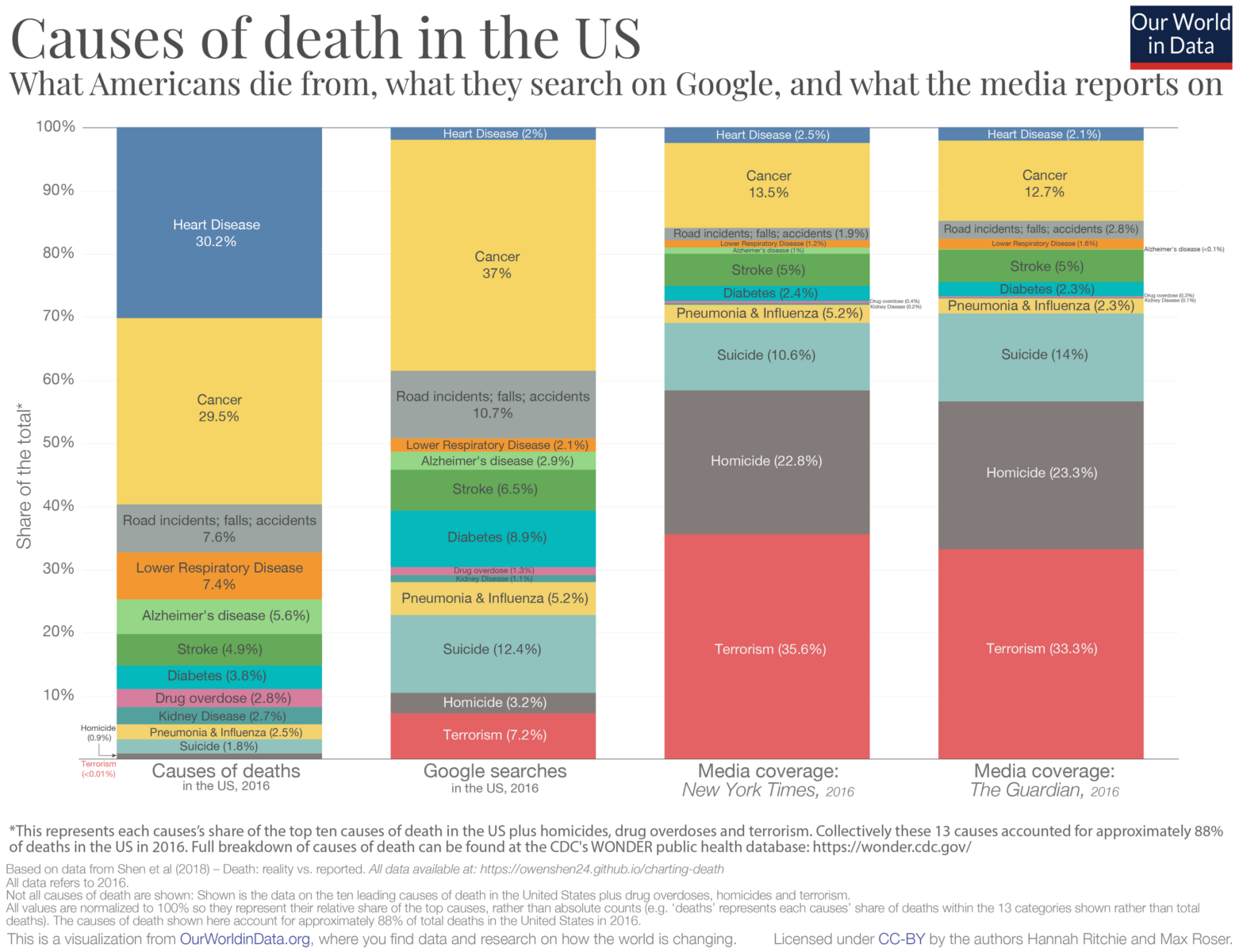

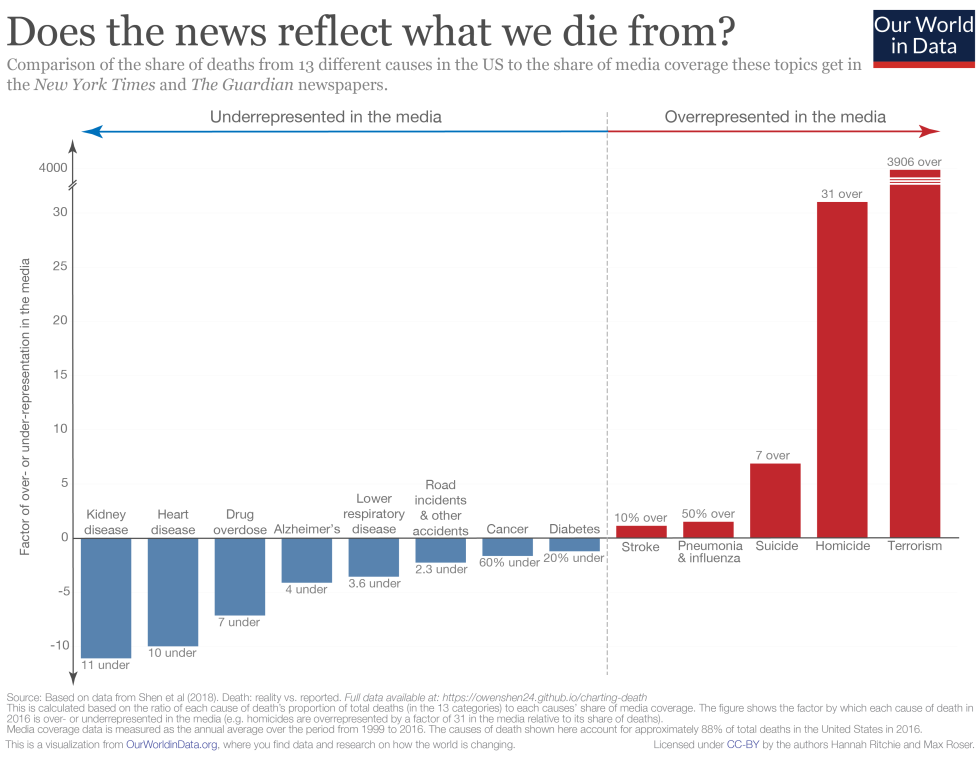

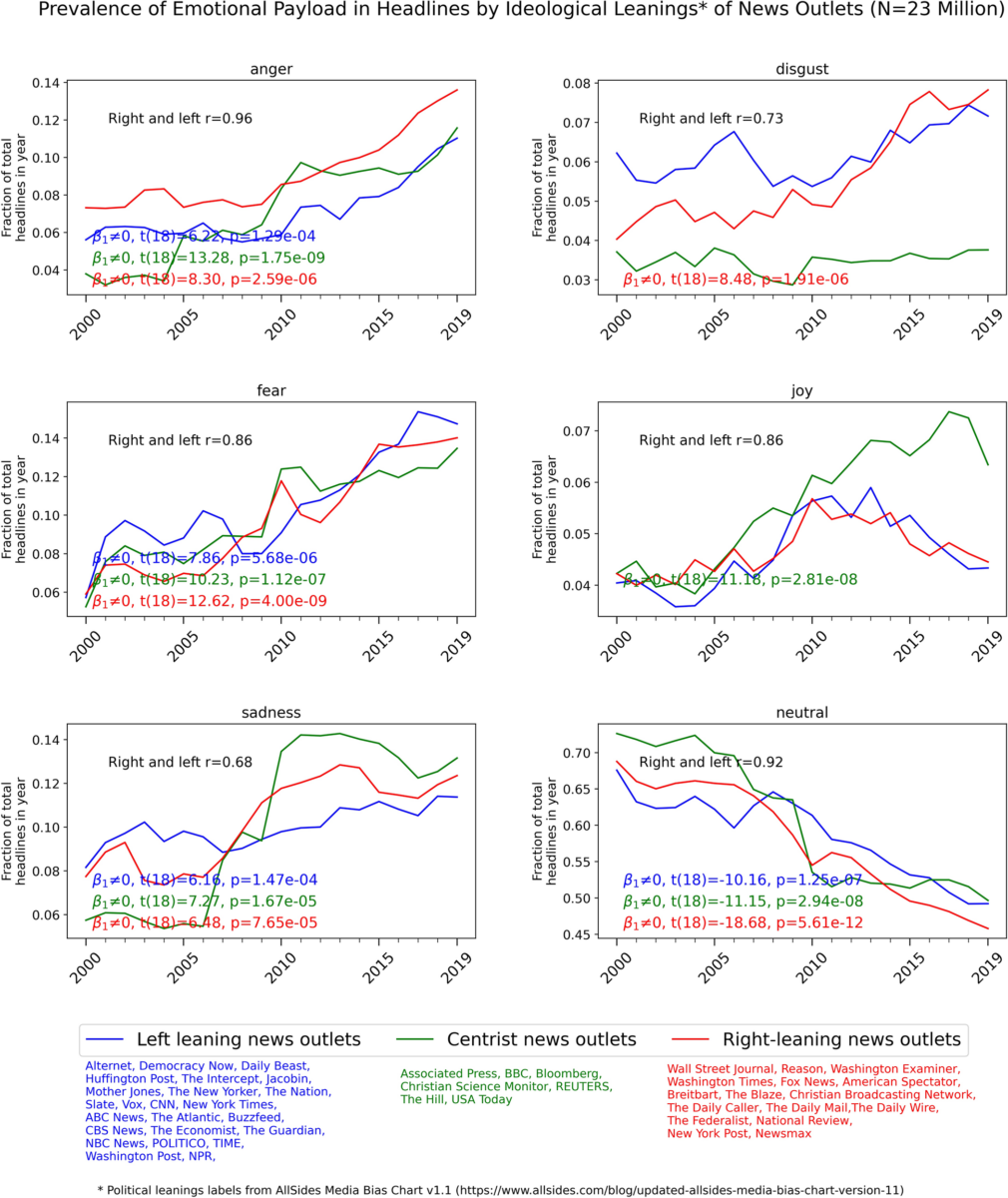

Individuals’ Internet Value Surged by Most in Many years Throughout Pandemic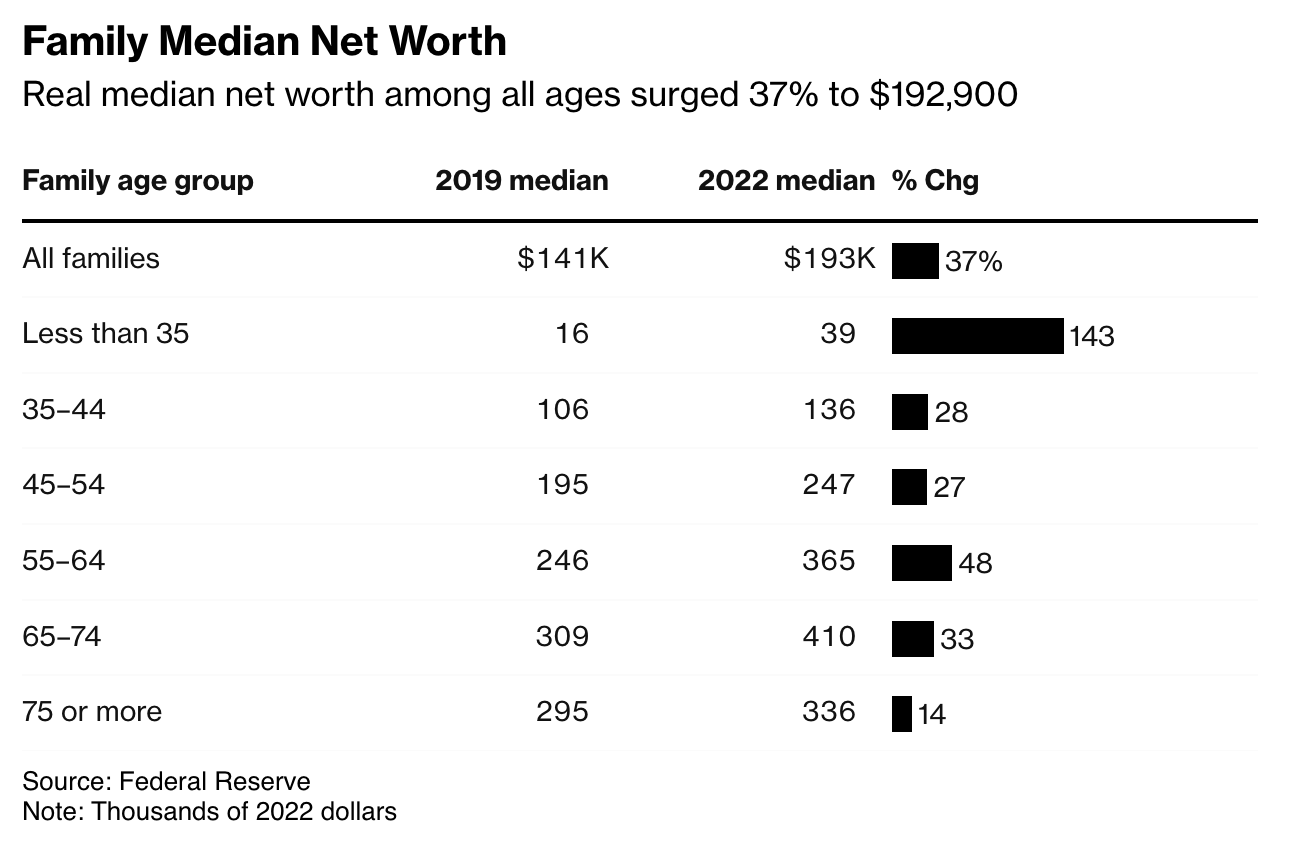

Supply: Bloomberg
